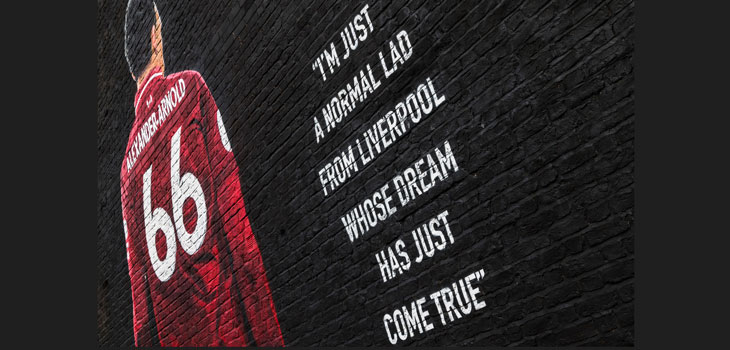Everything's Awesome!
Feb. 28, 2022

While ‘Liverpool Football Club scrolling’ the other day (yes, I admit to having become a hopelessly addicted soccer fan), I came across a lovely description of one of my favourite players, Trent Alexander-Arnold.
Reporting on Liverpool’s 2-0 win over Arsenal in a Carabao Cup game last month, Guardian journalist Jonathan Liew had this to say:
Jota popped up with an early goal to settle Liverpool’s nerves and a second late on to settle them again, both expertly assisted by the scintillating Trent Alexander-Arnold.
The “scintillating Trent Alexander Arnold.” Try rolling that one around your tongue a few times.
Of course, Liew could have called Alexander-Arnold many things. He could have called him “dependable”—TAA (as he’s also known) currently tops the Premier League stats table for most assists and crosses this season. He could have called him “skillful”—for the 23-year old has a knack of lobbing the ball precisely where his striker teammate wants it.
Or, he could have called him “opportunistic” because, as every Liverpool fan knows, it was Trent’s “corner taken quickly” that clinched Liverpool’s win over Barcelona to advance to the 2019 European Championship final. (Watch this 22-second video to see what I mean. And note the completely stunned look on Lionel Messi’s face!)
Of all the possible adjectives Liew could have applied to Trent, I’m just grateful he didn’t resort to the a-word. While there’s no denying that the “awesome Alexander Arnold” has a nice alliterative ring to it, in my view, that’s not enough to justify its use here.
“Awesome” comes to us from the 16th century. Back before we started applying it willy-nilly to anything and everything, “awesome” meant “filled with awe, profoundly reverential.” I would argue that awesome should be reserved for truly awe-inspiring scenes—like Mount Everest seen through the clouds, a perfect spider’s web glistening with dew, Titian’s painting of the Assumption in the Church of the Frari in Venice. You get the idea.
But instead, these days, everything’s awesome.
You mention to a friend that you tried a new café. The response: awesome. You tell a cashier you’ll pay by credit. The response: awesome. You request fries with your burger. Again, awesome. Why, even my local Thai restaurant has a sign in the bathroom: “Our plumbing is old and fragile. Please help us stay awesome. Do not throw paper towels in toilets.”
Now, I know it behooves a dusty old grammarian like me to keep up with the times, but when we use a word like “awesome” over and over and over again, we should be aware that while we’re busy helping to evolve the word’s meaning, we’re also debasing its power.
In fact, there’s a phrase for this sort of thing: semantic bleaching. According to Samantha Enslen, writing for Grammar Girl, semantic bleaching occurs when “the specific, often powerful meaning of a word becomes diluted over time through repetition and overuse."
When it comes to describing our business, our service, or our projects, how many of us use the corporate equivalent of “awesome”?
How often do we read that company X, Y or Z offers “extensive expertise”, “innovative solutions” or “service that exceeds client expectations”? How often do these same companies claim they are “driving positive change”? And what about “our people are our strength”? (Once, just once, I’d like to see a company say, “Well, we have a bunch of lazy duds on our payroll, but what we can do—labour is in short supply.”)
When everyone’s offering the same “awesome” thing, how can we possibly tell A apart from B?
Next time you’re tempted to fall back on one of these commonplace words or phrases, stop and ask yourself if you can do better. Challenge yourself to satisfy the ABC rule.
- A is for accuracy. Is what you’re saying really true? Can you prove it?
- B is for boldness. This is the opposite of boring. It’s about being different. Can others just as easily say the same thing? If so, try to rethink and rephrase.
- C is for clarity. Is your headline, tagline or claim simple, memorable and comprehensible?
If you remain stuck on the idea of “awesome”, at least check out these synonyms: breath-taking, amazing, stunning, astounding, astonishing, awe-inspiring, stupendous, staggering, extraordinary, incredible, unbelievable, magnificent, spectacular, remarkable, phenomenal, prodigious, miraculous, imposing, impressive.
With an “awesome” list of alternatives like that at your disposal, I’m sure you’ll be far less tempted to apply the word to something as banal as a sign above a toilet.
Trent Alexander-Arnold, on the other hand…
Remember this:
To craft “awesome” copy—copy that stands out from the crowd—make sure your words are accurate, bold and clear.
